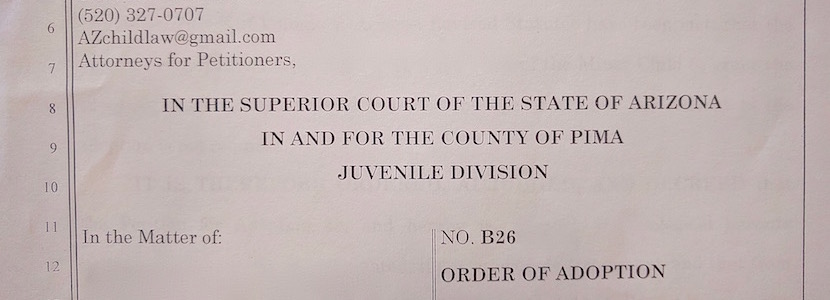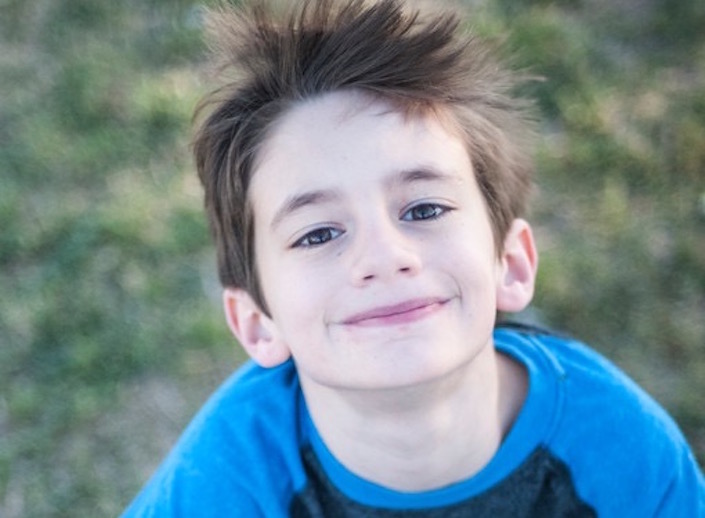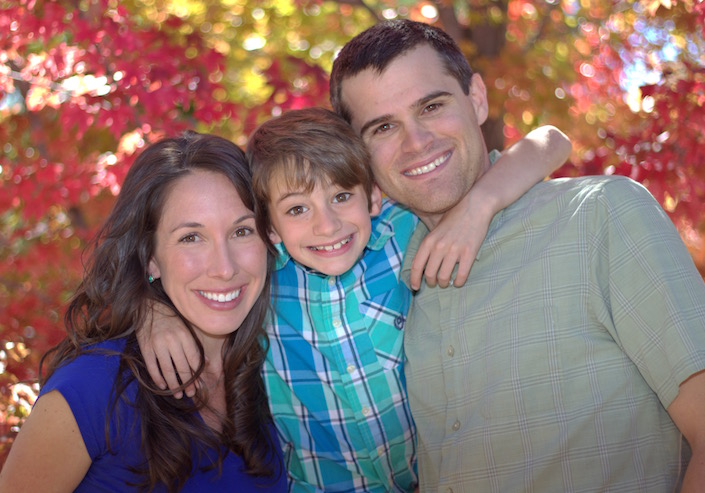
Our Adoption Announcement Letter
I wrote this almost four years ago, when we found out that we were likely to be adopting C from foster care. You can see all of my posts about foster care and adoption here.
We completed a second adoption from foster care a few months ago – and November is National Adoption month! – so it seemed like a good time to share this publicly. We didn’t include any photos in that original letter, but I have included some here just for fun.
If you are working on your own adoption announcement, feel free to use any of this that applies to you – and CONGRATS!

Our Adoption Announcement Letter
Dear Friends and Family,
Thank you for taking the time to read this! We hope this letter finds you and your loved ones well. We have some good news that we are excited to share with you: we’re adopting!
We realize this might be coming as a surprise, and you probably have some questions for us. Below we have compiled some of the frequently-asked questions we have gotten so far, as well as a couple questions we are anticipating. We hope you find this interesting and helpful.
Why did you write a letter?
We have already been asked (and we expect we will continue to be asked) a lot of questions about our decision to build our family through adoption. This seemed like a good way to get some of our answers out there while giving our friends and family time to digest this rather major decision. And writing letters is fun.
Where did this decision come from?
We have talked about adoption since before we were married. In 2014 we got involved with Catholic Charities. Catholic Charities is an organization that, among many ministries, advocates for adoptive parents and children who need families. The more we learned about adoption, the more we wanted to pursue it.
Why didn’t you tell more people sooner?
We didn’t know for sure what route to adoption we were going to pursue or how long the process was going to take. Early on we only told a few people, and most of those were acting as references for our agency. We have been “matched” with a child, so we decided it was time to spread the word. We are really excited to be sharing with everyone about this now!
What is matching? Who is the kid you’ve been matched with?
A “match” means that a child’s representative team (often including social workers, lawyers, child protective service employees, adoption agency representatives, etc) selected us as a child’s adoptive parents, and we agreed to it. Our child is a 9 year-old boy, and he’s awesome!
You’re adopting an older kid? Why not a baby?
There are a lot of families waiting to adopt babies – which we think is great! Infant adoption is a beautiful way to build a family. However, there are also a lot of older kids that are waiting for families, both in the U.S. and around the world. It is hard to come by accurate statistics in this area, but experts estimate that in the U.S. a child’s chance of being adopted if available at birth is near 100%. The likelihood of adoption decreases with each additional year of age. At age 1-4 years, it is 1 out of 3. Around age 5, it is 1 out of 15. At age 12 it is 1 out of 100. Children who “age out” of the foster care system at age 18 without being adopted have a very high chance of becoming homeless (info taken from the U.S. Department of Education).
We both have the privilege of working with lots of older kids almost every day at our jobs, and we think older kids are awesome. Adoption of an older child from foster care is not the right choice for everyone, but we feel it is the right choice for us.

Are you doing this because you can’t have biological kids?
Nope. We’re adopting because we want to adopt.
Well, aren’t you going to have biological kids?
We have no current plans in that area.
Is this what you’ve been doing with all that free time you seem to have?
Pretty much. There was tons of paperwork, 30 hours of formal classes, a home inspection, doctor’s visits (to assess whether we are physically and mentally able to raise children), phone interviews, in-person interviews, investigations into our finances, reference letters, two sets of fingerprinting clearances, background checks in every state we’ve lived in, and background checks through the FBI. More recently, we’ve spent a lot of time traveling to the city our child was living in before moving here. We would be happy to tell you more about the logistical process of getting licensed to adopt if you are interested.
Isn’t adoption really expensive?
Not always. Domestic adoption of children who have been in state care, also known as adoption from the foster care system, costs very little out-of-pocket ($0 to $1,500, with most being under $500). This is the route that we have chosen for our adoption. Most adoption costs are covered or reimbursed by the state that had custody of the child. The children who have been in state care are sometimes eligible for state subsidies and benefits after adoption as well.
International adoption and private domestic adoption are different from foster care adoption, and typically costs are much higher ($10k to $40k or more). There is a wide rage of costs depending on the type of adoption and the agency and/or countries involved. Adoption tax credits can apply to private and international adoptions.
Doesn’t adoption take a really long time?
Like many things, it depends on who you ask and it depends on the case in question. We have heard that the average is 1-3 years, start to finish. Some adoptions take longer. We did a lot of research and a lot of talking before we started reaching out to potential agencies. We started our adoption classes in December 2014. We finished our home study in February 2015. We got our license in mid-May, and we had our “match” in June.
How soon will your adoption be official?
Most states, ours included, require at least six months between an adoptive placement (which is when a child moves into an adoptive family’s home) and finalization (which is when the adoption is recognized legally and made permanent). This assumes that the child is already legally free for adoption. Sometimes it takes much longer than six months. A family must be licensed before a placement happens, so those six (or more) months do not include the time required to get licensed and matched. Regardless of the route a family takes to adoption – through foster care, private adoption, or international adoption – it’s a long process in a complicated system. Feel free to ask us more about the details if you’re interested.
You guys like traveling – did you consider international adoption?
A little bit, actually. Anyone who has met us knows that we love visiting other countries and learning about other cultures. We might pursue an international adoption in the future.
I heard that international adoption is better than adoption from the U.S. (or visa versa) because (lots of reasons). What do you think?
There are pluses and minuses in every route to building a family. We think all adoptions are amazing and the new families created should be celebrated – regardless of the child’s birthplace.
How do kids in the U.S. end up available for adoption?
A child may be placed for adoption for a variety of reasons. The bottom line is that their biological parents were unable to take care of them and either relinquished their parental rights voluntarily or their parental rights were terminated by the courts (a TPR). This means that the state is the child’s legal guardian until an adoption occurs or the child turns 18.
Right now there are over 100,000 children in the United States who are in this situation waiting to be adopted.
Aren’t you worried about your kid’s birth family coming back for him?
No. The children available for adoption are in situations where their biological parents’ rights have already been terminated by the courts, and any opportunities for appeals have already passed. It is true that some adoptions are challenged very late in the process, and there is a slight chance that could happen to us. However, after the adoption is finalized, our child will be legally part of our family just as if he were born into it.
Don’t all adopted kids have “problems”?
Unfortunately, it is really easy to find “horror stories” about adopted children. Please refrain from sharing discouraging stories about adoption and adopted children with us. We are pretty sure we have heard some variation of every story out there.
We have also seen the research and statistics on adoption. The reality is that children who are adopted are not much more likely than children raised by biological parents to have major issues. The vast majority of experienced adoptive parents report a very close relationship with their adopted children, and say that they would definitely do it again.
That being said, many children who become available for adoption have been through significant trauma. Many have been neglected or abused by the people that were supposed to love and care for them. These children have been hurt more than most of us can imagine, so trust is understandably difficult for many of them. What these children have gone through is not their fault, and they need and deserve stability, patience, and compassion. It can be very challenging for anyone, even a well-adjusted adult, to try to recover from physical or emotional trauma.
We know it will be a big adjustment for our child to join our family, and we will deal with some challenges that parents of biological children typically do not face. Please be supportive of us during this transition, and feel free to ask us more about this topic if you are interested.
Do you think you can love an adopted child as much as you can love a biological child?
Absolutely. Parents who have built their family through both birth and adoption will attest to this, and we have found that the research in these areas strongly supports this as well. Genetic similarity has very little to do with the love we feel for the people in our lives.
There are a bunch of articles online about what not to say to adoptive parents. Why are you people so hyper-sensitive about everything?
Fair question. Adoption is a hot topic for a lot of people. We try not to be too sensitive to comments and questions. We actually really like sharing about adoption! Sadly, people do ask and say rude things about adoptive families – sometimes even in front of children or directly to children. If you have something to ask and you’re not sure if it’s appropriate, just ask us in private.
I’m not sure if I should ask this but……?
We realize it can be hard to know what to say and what not to say about adoption topics, especially if you’ve never been involved in an adoption. We also know most people are genuinely interested in us and our family, and they are not purposely trying to say anything wrong or offensive. Here are some tips we’ve learned that we hope are helpful:
-Do ask us about our experience with the adoption process, if you are interested.
-Don’t share negative stories you have heard about foster care and adoption.
-Do share fun stories about your own experiences with children.
-Do tell us about the places/activities/foods/toys that you enjoy with the kids in your life.
-There are usually some details about children’s pasts that adoptive parents won’t discuss. You are welcome to ask us about anything you are interested in, but please understand if we choose not to share some details.
-We know adoption is not the right choice for every family, but please avoid comments like “That must be so hard” or “I could never do that” in front of our child. We never want our child to feel like their presence in our lives is a burden.
Is there any adoption terminology I should know?
As you might expect, adoption circles have their own lingo, and like many things it sometimes seems like it’s constantly changing. Here are some of the basics:
-We usually use “their biological child” when discussing children that are genetically related to their parents, and “their adopted child” when discussing children who were adopted – and only when the distinction really needs to made. Otherwise it’s just “their child”.
-We try to avoid using “their real child” or “their own child” to distinguish biological kids from adopted kids. All kids are real, right?
-We try not to use “real family” when referring to birth family or biological family (sometimes also called “first family”). All types of families are real families.
-When we discuss a child’s biological parents, we try not to say that they “gave them up” or “had them taken away”. We say “they were unable to parent.” Along the same lines, we say that children “were placed for adoption” not “given up”.
-If biological parents voluntarily chose adoption for a child at birth, we say they “made an adoption plan”.
-Adoptive families are sometimes called “forever families”.
I still have lots of questions! Are you going to be irritable if I ask them?
No! We would be happy to talk more about this with you if you would like! So please ask. If you are interested in another great resource for friends and family of adoptive parents, we recommend the book In On It by Elisabeth O’Toole.
Thank you again so much for reading our letter. We look forward to sharing more of this exciting journey with you!
Sincerely,
Us

November is National Adoption Month! Learn more here.
Got questions for us about foster care or adoption? Feel free to leave them in comments!